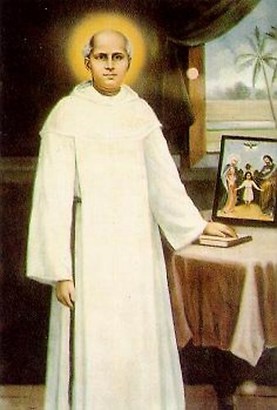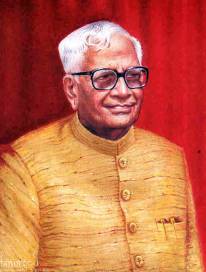
18 February
St Kuriakose Elias Chavara (1805-1871)
Indian Syro-Malabar Catholic priest, philosopher and social reformer
Founding member of CMI and founder of CMC Congregations
Born 10 February 1805
Kainakary, Kuttanad, Travancore, British Raj (now in Alappuzha district, Kerala, India)
Died 3 January 1871 (aged 65)
Koonammavu, Kingdom of Cochin, British Raj (now in Ernakulam, Kerala, India)
Venerated in Catholic Church
Beatified 8 February 1986, Kottayam by Pope John Paul II
Canonized 23 November 2014, Rome by Pope Francis
Major shrine
St. Joseph’s Church, Mannanam, St.Philomena’s Forane Church, Koonammavu
Feast
18 February (Roman Latin Catholic Church)
3 January (Syro-Malabar Church)
Patronage
Press industry, media, literature, congregations
[An Extract]
The HOMILY OF HIS HOLINESS JOHN PAUL II
during The Pope’s Apostolic Pilgrimage to India
Beatification of Fr Kuriakose Elias Chavara and Sr Alfonsa Muttathupandathu at Nahru Stadium, Kottayam – Saturday, 8 February 1986
Father Kuriakose Elias Chavara was born here in Kerala, and for nearly all of his sixty-five years of earthly life he laboured generously for the renewal and enrichment of the Christian life. His deep love for Christ filled him with apostolic zeal and made him especially careful to promote the unity of the Church. With great generosity he collaborated with others, especially brother priests and religious, in the work of salvation.
In co-operation with Fathers Thomas Palackal and Thomas Porukara, Father Kuriakose founded an Indian religious congregation for men, now known as the Carmelites of Mary Immaculate. Later, with the help of an Italian missionary, Father Leopold Beccaro, he started an Indian religious congregation for women, the Congregation of the Mother of Carmel. These congregations grew and flourished, and religious vocations became better understood and appreciated. Through the common efforts of the members of new religious families, his hopes and works were multiplied many times over.
Father Kuriakose’s life, and the lives of these new religious, were dedicated to the service of the Syro-Malabar Church. Under his leadership or inspiration, a good number of apostolic initiatives were undertaken: the establishment of seminaries for the education and formation of the clergy, the introduction of annual retreats, a publishing house for Catholic works, a house to care for the destitute and dying, schools for general education and programmes for the training of catechumens. He contributed to the Syro-Malabar liturgy and spread devotion to the Holy Eucharist and the Holy Family. In particular, he dedicated himself to encouraging and counselling Christian families, convinced as he was of the fundamental role of the family in the life of society and the Church.
But no apostolic cause was dearer to the heart of this great man of faith than that of the unity and harmony within the Church. It was as if he had always before his mind the prayer of Jesus, on the night before his Sacrifice on the Cross: “That they may all be one; even as you, Father, are in me, and I in you, that they also may be in us”.
Today the Church solemnly recalls with love and gratitude all his efforts to resist threats of disunity and to encourage the clergy and faithful to maintain unity with the See of Peter and the universal Church. His success in this, as in all his many undertakings, was undoubtedly due to the intense charity and prayer which characterised his daily life, his close communion with Christ and his love for the Church as the visible Body of Christ on earth.
Source: The Holy See

Saint Kuriakose Elias Chavara: a true karma yogi
Viju P Devassy and Albert Abraham write: He was contemplative in action and worked tirelessly to liberate people from the tyrannies of ignorance, poverty, and sickness.
History often fails to do justice to social reformers who have also been religious leaders. Saint Kuriakose Elias Chavara, who triggered a renaissance in Kerala in the 19th century, was one such reformer who was also a man of faith. The 150th death anniversary of this saint-reformer — which was commemorated on January 3 — is an occasion to revisit his life and works.
Saint Chavara was a social reformer, an educationist, a social entrepreneur, and a prolific poet
He deserves a place in the pantheon of socio-religious reformers that includes Ram Mohan Roy, Swami Vivekananda, Jyotirao Phule, Swami Dayananda Saraswati and Sree Narayana Guru. Millions, irrespective of caste and creed, benefited from his work, which triggered a social, cultural and intellectual awakening in Kerala.
Saint Chavara was a pioneer of education reforms
When education was the privilege of the social elites, his Pallikkoodam movement (setting up schools in church premises) enabled universal access to education. As the Vicar General of Syro-Malabar Christians, he ordered that schools be set up on all church premises and threatened to close down those that failed to comply. He also started free mid-day meals and provided clothes and books to reduce drop-outs among the poor and Dalit students. For this purpose, he mobilised resources by collecting pidiyari (a handful of rice) and tithe from well-off families. The practice initiated by Saint Chavara in Christian schools influenced the diwan of Travancore, C P Ramaswamy Iyer, to plan mid-day meals in government schools in 1936. In 1846, Saint Chavara established a Sanskrit school in Mannanam in Kerala, that enabled ordinary people to study the sacred Hindu literature in Sanskrit.
Founder of Catholic Religious Congregations
The first indigenous Catholic religious congregation for men (CMI) he founded in 1831 supplied dedicated and highly-skilled personnel for managing the schools and institutions. The first religious congregation for women (CMC-CTC) he founded in 1866 established schools to promote education for women with boarding facilities. It was a starting point for women’s empowerment in Kerala. These congregations continue to pursue Saint Chavara’s vision of universal and affordable education, by running hundreds of educational institutions across the country.

In the words of former President R Venkataraman,
Saint Chavara “represented a major manifestation of the Indian renaissance, which was to raise our underprivileged, to alleviate distress and infuse our people with a sense of pride in themselves”.
Founder of the Press at Mannanam
In 1846, with the permission of Swathi Thirunal, the maharajah of Travancore, Saint Chavara founded a printing press in Mannanam, and published educational materials and books to promote social harmony. He was convinced that the print media was a powerful medium to further learning. This venture not only contributed to the expansion of knowledge in Malayalam, but also effectively resisted the monopoly of colonial interests in the publishing domain. Deepika, the oldest Malayalam newspaper now in circulation, was started from this press in 1887.
House of Charity
As a mark of his exceptional altruism, Chavara founded a House of Charity in 1869 in Kainakari, his native village, for the aged, the abandoned and the sick. Saint Chavara raised resources for his educational and social interventions through paddy cultivation and small contributions from the local community.
Well-versed in Malayalam, Sanskrit, Latin and Syriac, Saint Chavara wrote extensively
His poem Anasthasyayude Rakthasakshyam (The Martyrdom of Anastasia, 1862) is considered the first minor epic in Malayalam. Atmanutapam (Compunction of Heart) reveals the yogic poet in him exploring the rumblings of the inner self. Oru Nalla Appante Chavarul (Testament of a Loving Father) is a treatise on the upbringing of children, settling family disputes and the importance of writing wills. His correspondence with the Church authorities in Rome and letters to the public are of great literary and documentary value — they throw light on the socio-cultural background of 19th century Kerala.
An apostle of peace and religious harmony
In his autobiography, Nalagamam (Chronicles), Saint Chavara vividly narrates how Hindus, Muslims and Christians together toiled hard to establish his monastery in Mannanam. He realised that God’s glory relies on the greatness of humans. He was a true karma yogi, contemplative in action and working tirelessly to liberate people from the tyrannies of ignorance, poverty, and sickness.
This column first appeared in the print edition on January 5, 2021 under the title ‘A true karma yogi’. Devassy is Director and Dean of CHRIST (Deemed to be University), Delhi NCR Campus, and Abraham teaches Media Studies.
Source: The Indian Express
MILESTONES IN THE LIFE OF SAINT KURIAKOSE ELIAS CHAVARA
10-02-1805 Born at Kainakary, Kerala
18-02-1805 Baptized at Chennamkary Parish Church
08-09-1805 Dedicated to Blessed Virgin Mary as her servant at Vechoor Church
1810 Started primary education at Kainakary
1818 Joined the parish seminary at Pallipuram
29-11-1829 Ordained priest at ArthunkalChurch
11-05-1831 Foundation of the first Indian indigenous religious congregation for men, Carmelites of Mary Immaculate (CMI), along with Father Thomas Palackal and Father Thomas Porukara
1831 Popularized Sunday Homilies and introduced Retreats for priests and laity in the Kerala Church
1833 Establishment of the first Syro-Malabar Common Seminary at Mannanam
1838 Introduction of ‘Way of the Cross’ devotion at Mannanam
16-02-1844 Appointed Malpan (tutor of sacred subjects) and examiner of Scholastics withthe authorization to issue patents to the newly ordained priests to hear confession and to preach in the Church
03-07-1846 Foundation of the first printing press and publishing house of the Syro-Malabar Church at Mannanam
1846 Foundation of the First Catholic Sanskrit School at Mannanam
1853 Foundation of the First Syro-Malabar Catechumenate at Mannanam
08-12-1855 First priest to profess as religious in the Indian Church (along with 10 other members)
1856-1857 Wrote 10 Eclogues (Shepherd Plays) on the nativity of Jesus Christ
27-07-1861 OCD Affiliated the Congregation as Third Order of Carmelites Discalced (TOCD)
08-06-1861 Appointed as the First Vicar General in the Syro-Malabar Church after the time of Archdeacons
1861 Fought for Syro-Malabar Church against schismatic intruder bishop Roccos
1862 Wrote the First Malayalam Narrative poem, AnasthasiayudeRaktha-sakshyam, an inspirational story of a martyr
1862-1869 Edited the Divine Office for priests, compiled and composed Liturgical Rubrics, Liturgical Calendar, Office for the Dead, Little Office of Immaculate Mother, etc., in the Malabar Church
1864 Introduced the ‘May Devotion of Blessed Virgin Mary’at Mannanam
1864 Implemented the concept, ‘A School for a Church’ (Pallikkudam), in the Syro-Malabar Church as its Vicar General
13-02-1866 Foundation of the Indian Religious Congregation for women, Congregation of Mother Carmel (CMC), at Koonammavu together with Father Leopold OCD, an Italian Missionary
15-02-1866 Introduced 40 Hours Eucharistic. Adoration in Kerala at Koonammavu
02-01-1868 Started the first boarding house and school for girls in Kerala at Koonammavu together with Father Leopold OCD
13-02-1868 Wrote the first instruction manual, A Testament of a Loving Father (OruNallaAppante Chavarul) for Christian families, the first of its kind in the Church
1869 Foundation of the first lay charitable organization, the ‘Confraternity of Saint Joseph for Happy Death’ at Kainakary
1869 Foundation of the first Home of Charity, Upavisala, for the sick, old, and destitute at Kainakary
1869 Initiated Catholic reunion movement
03-01-1871 Slept in the Lord at SaintPhilomina’s Monastery at Koonammavu
04-05-1889 Mortal remains reinterred at Saint Joseph’s Monastery, Mannanam, Mother House of the CMI Congregation
21-12-1936 Canonization process started at the congregational level
09-12-1955 Official permission to start the process of Canonization
03-01-1958 Diocesan process started with the title Servant of God
07-04-1984 Declared Venerable by Pope John Paul II in Rome
08-02-1986 Beatification at Kottayam, Kerala, by Pope John Paul II
20-12-1987 Release of the postal stamp by the Government of India in recognition of the social commitment of Saint Chavara
04-05-2006 Portrait of Saint Chavara unveiled in the Literary Academy Hall of Thrissur by Government of Kerala for contribution to Malayalam literature
19-10-2014 Publication of Eclogues by Kerala Sahithya Academy
23-11-2014 Canonization of Saint Kuriakose Elias Chavara at Vatican by Pope Francis
Source: ChavaraLibrary.in
Another version of the saint’s Biography at StChavara.org